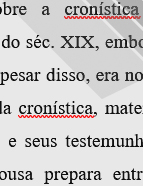

................................
At the same time, William J. Entwistle of Oxford University was preparing an edition of the second part of the Crónica de D. João I, by Fernão Lopes (1935), which was only published posthumously, in 1977, and which included the translation of that article as an introduction. Costa Veiga, Rocha Madahil, Morais Sarmento and Hernâni Cidade, on the other hand, discussed aspects of the chronicles of Rui de Pina, Duarte Galvão and Fernão Lopes. The discussions of these authors, which were sparse and difficult to trace, included topics such as the authorship of the Crónica do Condestabre (in which Aubrey Bell, the British author of a critical history of Portuguese literature, also participated); analyses of the prose of chronicles (with the participation of Vitorino Nemésio); the epic origin of the story of Afonso Henriques in the IV Crónica Breve [Fourth Short Chronicle]; and even the antiquity of the short text preserved in the Biblioteca Municipal do Porto [Oporto Municipal Library]¸ dated back to the mid-14th century by Costa Veiga (an accepted date) at a time when it was considered to be post- Fernão Lopes or, as argued by Alfredo Pimenta, whose anteriority or posterity in relation to the Crónica de D. Afonso Henriques [Chronicle of D. Afonso Henriques] by Duarte Galvão (written in 1505) was impossible to ascertain. The idea that the homeland was thus being served, a markedly nationalist agenda aligned with the ideology of the regime, which ran through many of these studies (though it should be noted that it did not prevent them from reaching some important conclusions), was stated by Pimenta himself in the introduction to Idade Média. Problemas e Soluções [Middle Ages. Issues and Solutions] (Lisbon, 1946, p. XV): "I serve it [the homeland] as best I can: by studying and communicating the results of my studies to those who wish to read me”.
With the discovery in June 1942 of a 15th-century chronicle of the first five kings, Artur de Magalhães Basto and, shortly after him, Carlos da Silva Tarouca who had discovered an unpublished manuscript of that chronicle which included the reigns of D. Dinis and D. Afonso IV, the historiography of the time was ignited.
